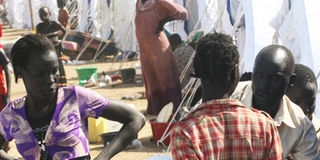South Sudan refugees sell relief items to Adjumani locals

Refugees in Nzaipi Reception Centre in Adjumani District. PHOTO BY STEPHEN OKELLO
What you need to know:
Items such as blankets and delivery kits bearing logos of humanitarian agencies are cheaply sold to communities.
ADJUMANI- South Sudanese refugees in Adjumani District have begun selling off relief items provided to them by several humanitarian agencies.
A recent mini-survey by the Daily Monitor revealed that items bearing logos of humanitarian agencies are cheaply sold to communities. Some of the items include food, mats, blankets, delivery kits and detergents.
A refugee who declined to be named said she has decided to sell off part of the food items given to her family to enable her buy clothes for her children.
“It was not my wish to sell part of the relief aid but because we escaped without anything, I have decided to sell part of the food ration for buying clothes for my children.”
Another woman, Ms Catherine Bol, said: “It’s the only way for us to get some money to buy some personal items which UN does not provide. We are not given money here so we have to improvise.”
When contacted, Mr Titus Jogo, a refugee desk officer, said he is not aware that some of the relief aid given to the refugees ends up in the hands of the host communities.
He said he had not received any complaint from the humanitarian agencies about refugees selling off the items, adding that it is difficult to eliminate such dealings between the asylum seekers and the host community.
The World Food Programme and other humanitarian agencies provide the food and other non food items to every refugee family head, depending on the number of dependants he or she has.
Mr Musa Ecweru, the Minister of State for Disaster Preparedness and Refugees, who visited Dzaipi Reception Centre recently, said in case the refugees stay long in the district, the government will avail them land for agriculture to enable them produce their own food.
THE STATUS
Camps: There are two major refugee centres in northern Uganda; Elegu camp in Amuru District and Nzaipi Reception Centre in Adjumani District. The camps are overwhelmed with numbers, leaving social services overwhelmed. Numbers. Uganda is the most popular destination for the refugees, with almost 25,000 arrivals since the crisis in South Sudan began.
Impact of conflict: According to UNHCR, more than 100,000 South Sudanese have fled to neighbouring Uganda, Ethiopia, Kenya and Sudan since mid-December.
Inside South Sudan: some 490,000 people are at present internally displaced, including 75,000 civilians seeking protection on UN bases.
Relief agencies: Doctors Without Borders, Oxfarm, Red Cross, World Health Organisation, UNHCR, Unicef, WFP, among others.



